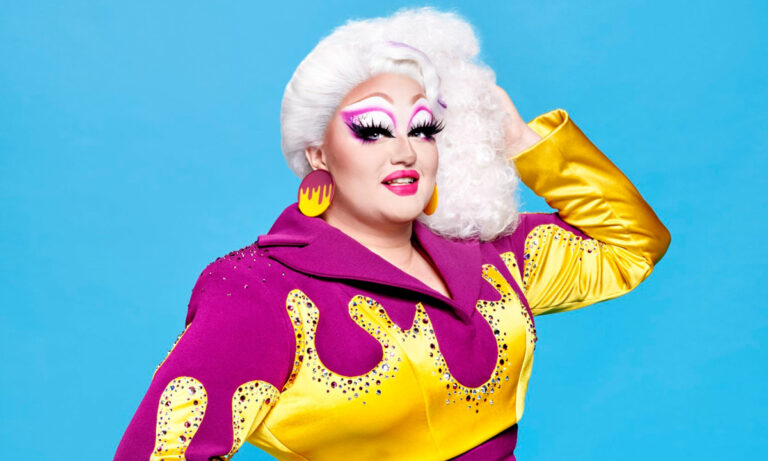RuPaul’s Drag Race UK’s first-ever cis woman competitor is not the problem, your misogyny is

Last week, RuPaul’s Drag Race UK announced the lineup for its third season, which arrives on BBC iPlayer next month. The third season was cast and filmed entirely during the COVID-19 pandemic—season two had a sudden and unexpected break in filming midway through the series. And if it feels like that series only just finished airing, you wouldn’t be wrong: Lawrence Chaney was crowned the show’s second champion in mid-March. But the producers wanted to get back to the show’s original timeline, airing each autumn. And as RuPaul now chairs four Drag Race shows filmed around the world—which have been on non-stop since New Year’s Day—she’s on a tight schedule.
But season three of Drag Race UK is set to make herstory, with the first cis woman competing for the crown. Victoria Scone is a Cardiff-based drag queen and performer—and a queer woman. Immediately, there was backlash on social media, particularly from Drag Race super-fans, the kind who have little knowledge of drag beyond RuPaul’s world. And, of course, they distracted from the real issue here: whether ‘scone’ is pronounced like ‘stone’ or like ‘gone’.
This is British drag, darling. @victoriascone is gonna 'av' ya for dinner. #DragRaceUK pic.twitter.com/Pb8vboVqag
— RuPaul's Drag Race UK (@dragraceukbbc) August 18, 2021
One Twitter user and YouTuber prompted significant outcry after posting a video titled ‘Why I Don’t Support Victoria Scone on RuPaul’s Drag Race’. He was promptly torn to pieces by drag queens from all over the world, including reigning champion Chaney, who posted her comments on Twitter: “Women raised me, I’m inspired by strong women and now Victoria is one of those strong women because of her standing up and showcasing who she is to the world, unapologetically. Sorry but you’ll just have to get used to it.”
The way my blood is boiling so I had to comment pic.twitter.com/ib9EqD5byB
— Lawrence Chaney (@ShadyLawrence) August 19, 2021
This news revealed the worrying misogyny that pervades much of the gay community. Recently, I saw a similar discussion about women in gay bars, with gay men seemingly determined to gatekeep such spaces—when, in fact, many queer bars are intended to serve the entire LGBTQ+ community, not just the G. And it should be noted that we are thoroughly lacking in spaces for and representation of queer women.
the level of misogyny and lesbophobia within the gay community 🤮 you need to check yourselves it’s actually embarrassing
— 𝕲𝖔𝖙𝖍𝖞 (@gothykendoll) August 19, 2021
“Drag is for everyone and anyone can do drag,” season two fan favourite Bimini Bon Boulash reminded us. Trans women have competed on RuPaul’s Drag Race All Stars—when queens have come out as trans in between competing on their original series and returning for All Stars. And the last US season cast Gottmik, the first trans man to compete on the show. RuPaul has previously made some rather disparaging comments about female drag queens—but it seems that she is now changing her mind and moving the show in the right direction.
For some time, Drag Race supported and elevated a very specific kind of drag: femme makeup, wigs, heels and padding. Slowly but surely, though, it has accepted and platformed more diverse drag artistry, like Sasha Velour and Ginny Lemon.
we really need to stop the “women stop coming to gay bars!” thing bc the truth is a lot of the women who come to male-centric gay bars are queer and there are simply very few spaces that are created for queer women
— matt (@mattxiv) August 18, 2021
There were, however, valid criticisms to be made of the Drag Race UK announcement. Many were pointing out that there was only one person of colour in the cast, which wasn’t technically accurate. While there’s only one black queen, two contestants are of mixed heritage—River Medway and Anubis Finch have Singaporean and Egyptian heritage, respectively.
But the criticisms didn’t stop there: only two of the queens aren’t from London and the South East; there’s no one from Scotland or Northern Ireland this year. People want to feel represented on such a prominent and popular show, but small towns and local scenes are consistently overlooked. Of course, true representation is nearly impossible, especially in a cast of twelve, and this is reality television, with casting decisions made to deliberately cause drama. But they could certainly do better.
To be clear: it is not the fault of any of the contestants that the casting is so deficient. Any and all blame lies entirely with the producers. Applications were no doubt down this year, with people wanting to wait until after the pandemic to apply. But it’s still largely inexcusable—perhaps not much has changed since the first cast was announced.
RuPaul is not and should never be the arbiter of everything drag, even if fronting two dozen seasons of drag reality competitions has effectively made that the case. Marla Sinner, a drag queen based in Glasgow, put it particularly eloquently. “Just because we can be cast now doesn’t mean we all want to,” she wrote. “It’s good progression but it’s a long time fucking coming and a long way to fucking go.”




